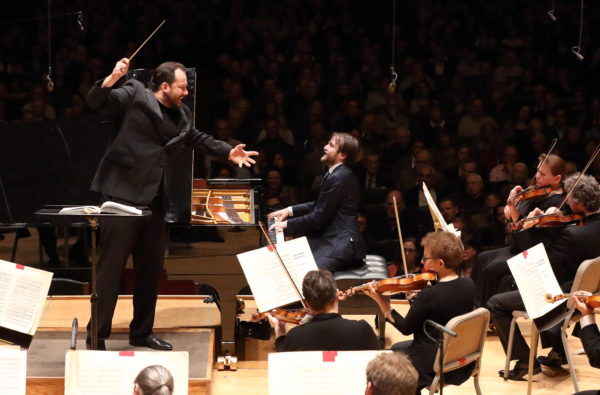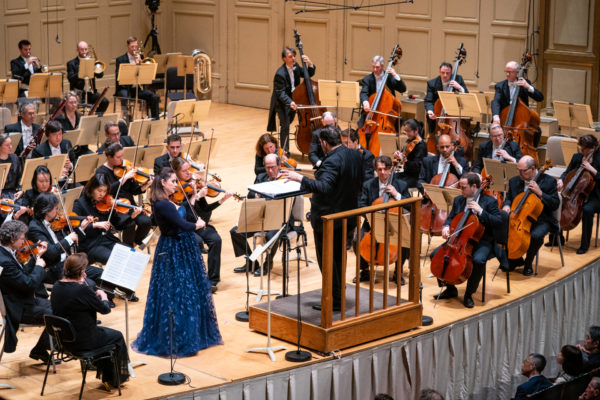Classical Music Reviews: The Boston Symphony’s 2018-19 Season-closing Concerts
By Jonathan Blumhofer
The final two concerts of the BSO’s season were in the orchestra’s sweet spot.

Andris Nelsons leads Daniil Trifonov and the BSO in Rachmaninoff’s Piano Concerto No. 3 in D minor. Photo: Hilary Scott.
The Boston Symphony Orchestra (BSO) ends its current season on a decided high note, with two weeks of concerts that play to the ensemble’s – and music director Andris Nelsons’ – strengths. Which is to say, there’s a lot of Russian music to be found.
Their penultimate subscription series, which wrapped on Tuesday, was nothing but, pairing major scores by stylistic opposites Sergei Rachmaninoff and Dmitri Shostakovich.
The Shostakovich in question was the Symphony no. 15, played as part of the orchestra’s ongoing complete-Shostakovich symphony series.
Written in 1971, it’s the composer’s last entry in the genre, filled with sometimes enigmatic quotations from composers as diverse as Gioachino Rossini, Richard Wagner, and Shostakovich himself. The four movements trace a course from bright irony (with jaunty snatches of the William Tell Overture) in the first to a sober funeral march in the second. A macabre third-movement scherzo provides a bridge into the finale, which builds to a searing climax before dissolving into a long, inscrutable coda highlighted by the menacing ticking of the orchestra’s percussion battery.
Tuesday’s reading bristled with color and energy. Rhythms were taut and the score’s freewheeling form came across with remarkable clarity. Indeed, Nelsons’ command of the Fifteenth’s rhetoric – its mélange of quotes, recitatives, chorales, and passacaglias – and structure was total: this was as coherent an account of a Shostakovich symphony as he’s led in Boston.
It was also about as emotionally-immediate as they’ve come. Tempos were broad, yes, but nothing felt unduly drawn out. The first movement gamboled with insouciant brio. Orchestral solos in the second – concertmaster Tamara Smirnova’s and principal cellist Blaise Déjardin’s chief among them – were tightly focused, while the droll third’s grotesque gestures (glissandos, dynamic swells, and the like) were shaped with care. The finale, with its lilting waltz on the edge of the precipice and scorching apotheosis, proved bleakly cathartic.
In all, then, Tuesday’s was a fiercely engaged reading: illuminating, characterful, and full of heart.
So was the Rachmaninoff Piano Concerto no. 3 that came before it on the program.
The soloist was the Russian-born keyboard virtuoso Daniil Trifonov, a pianist whose technical arsenal is second-to-none and whose feeling for the soulful, melancholy temperament of Rachmaninoff’s music is unimpeachable.
His first movement solos were played with a mix of plush tone – Trifonov’s entrances never lacked for warmth – and visceral might (nor was he ever covered by the orchestra playing full-blast). The second juxtaposed episodes of tempestuous energy and dreamy introspection, while the finale’s stormy moments surged. At the same time, its introspective bits – like the movement’s second subject – came across with sylphlike transparency.
Throughout, Trifonov’s playing was strikingly physical: he was hunched down over the keyboard over the opening movement’s soft last bars and the Concerto’s thunderous passages were hammered out with full-body force. But not once did Trifonov’s gestures get in the way of his musical ideas or his sense of where the music was headed.
In realizing the last, he was ably assisted by Nelsons, who’s often a conspicuously fine accompanist. He certainly was on Tuesday, carefully balancing solo-orchestral textures while also drawing out iridescent colors from the BSO.
Conductor, soloist, and orchestra were likewise simpatico in matters of pacing and phrasing. The Rachmaninoff Third Concerto is a big piece, often subject to cuts (none in this performance, though), and it can get lost in its own largesse pretty easily. Tuesday’s, with its electrifying energy and strong sense of character, never did.
Afterwards, Trifonov rewarded a deafening ovation with an encore of his own adaptation of Rachmaninoff’s Vocalise.

Violinist Baiba Skride premieres Sebastian Currier’s “Aether” under Andris Nelsons with the BSO. Photo: Robert Torres.
There were no encores on Thursday night, but that wasn’t for lack of a strong piece or a fantastic soloist.
The BSO’s final program of the season is built around the world premiere of Sebastian Currier’s Aether. A twenty-five-minute-long violin concerto for (and dedicated to) Baiba Skride, Aether takes its eponymous archaic concept – the notion of an invisible element that permeates and connect the universe – and applies it to the concerto genre. In so doing, Currier’s crafted a piece of beguiling, delicate beauty.
Its four movements alternate ethereal sections (often comprised of fragile, widely-spaced orchestral sonorities) with more conventional, concertante dialogues. The soloist enters in first movement after an orchestral introduction, exchanging phrases with the English horn. This dialoguing gesture becomes more involved, culminating in a wildly aggressive second movement. The third turns introspective, with several extended, soulful episodes for the violin. A solo cadenza provides the transition to the finale, in which combative, vaguely jazzy writing and a further set of cadenzas ultimately leads to a merging of the solo line with the stratospheric, “ethereal” orchestral part.
Skride’s account of the violin writing on Thursday was luminous and intense. Currier gave her a considerable amount of lyrical material with which to work and she got it all to sing. The bravura writing was executed with similarly bracing energy and stylish shape. While Aether may have been tailored to its dedicatee, it is one that showcases her instrument brilliantly: suffice it to say, violinists from all over ought to be lining up to play it.
Nelsons led the BSO in an accompaniment that exquisitely captured the mysterious moments in Currier’s writing. Aether’s haunting textures – the brittle string harmonics, bent notes, and extended techniques – came across with immediacy. Nor did its brash gestures (like the finale’s walking bass line and percussive riffs) lack for swagger.
The composer was on hand to bask in some well-deserved, fervent applause.
Prefacing Aether was Richard Strauss’s Till Eulenspiegel. Nelsons is a Strauss enthusiast and he led a clean-textured account of this impish rondo. Tempos were a bit precious and, over the first half or so, phrasings mannered. But the last third – from the rousing climax to the end – soared.
So did all of the BSO’s reading of Igor Stravinsky’s Petrushka, which closed the night.
Stravinsky’s ballet, with its echoes of The Firebird and anticipations of The Rite of Spring, is no stranger to the orchestra: Pierre Monteux, who led its world premiere in 1911, conducted the orchestra’s first performance of the piece in 1920. Nelsons hasn’t directed much Stravinsky over his first five seasons with the BSO, though one hopes that will change soon.
His Petrushka on Thursday was lean, brightly colored, and energetic. The first and last scenes, with their successions of dances, featured concentrated rhythms and strong contrasts of character. In the second (“Petrushka’s Room”), the woodwind flourishes burbled, while principal flute Elizabeth Rowe and principal trumpet Tom Rolfs brought resplendent tone to their Scene Three solos. Vytas Baksys dispatched the score’s ecstatic piano part with fire.
During the bows afterwards, Nelsons ceded the podium to bass clarinetist Craig Nordstrom, who is retiring following more than four decades with the BSO. On a night filled with big cheers, he received some of the loudest.
Jonathan Blumhofer is a composer and violist who has been active in the greater Boston area since 2004. His music has received numerous awards and been performed by various ensembles, including the American Composers Orchestra, Kiev Philharmonic, Camerata Chicago, Xanthos Ensemble, and Juventas New Music Group. Since receiving his doctorate from Boston University in 2010, Jon has taught at Clark University, Worcester Polytechnic Institute, and online for the University of Phoenix, in addition to writing music criticism for the Worcester Telegram & Gazette.
Tagged: Andris Nelsons, Baiba Skride, Boston Symphony Orchestra, Craig Nordstrom
